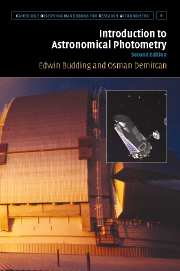Book contents
- Frontmatter
- Contents
- Preface to first edition
- Preface to second edition
- 1 Overview
- 2 Introduction
- 3 Underlying essentials
- 4 Themes of astronomical photometry
- 5 Practicalities
- 6 Procedures
- 7 Basic light curve analysis
- 8 Period changes in variable stars
- 9 Close binary systems
- 10 Spotted stars
- 11 Pulsating stars
- Appendix
- Author index
- Subject index
Preface to second edition
Published online by Cambridge University Press: 13 August 2009
- Frontmatter
- Contents
- Preface to first edition
- Preface to second edition
- 1 Overview
- 2 Introduction
- 3 Underlying essentials
- 4 Themes of astronomical photometry
- 5 Practicalities
- 6 Procedures
- 7 Basic light curve analysis
- 8 Period changes in variable stars
- 9 Close binary systems
- 10 Spotted stars
- 11 Pulsating stars
- Appendix
- Author index
- Subject index
Summary
Some years ago professional colleagues suggested that a new edition of An Introduction to Astronomical Photometry could be useful and timely. The decision to act upon this did not come, however, until the warm and conducive summer of 2003, in the stimulative environment of north-west Anatolia, once home to great forefathers of astronomy, such as Anaxagoras and Hipparchos. The former set up his school at the surely appropriately named Lampsakos, just a few miles from where the present authors are working: the latter hailed originally from what is now the Iznik district of neighbouring Bythinia. Eudoxus too, after learning his observational astronomy in Heliopolis, moved back to Mysia to found the institute at Cyzicus (today's Kapu Dagh), while Aristotle's thoughts on the heavens must have also been developing around the time of his sojourn in the Troad, after the death of Plato. In such surroundings it is difficult to resist thinking about the brightness of the stars.
But that was just the beginning. It quickly became clear that the proposed task could not be lightly undertaken. There were at least three main questions to clarify: (1) what branches of modern astronomy can be suitably associated with photometry; (2) what level of explanation can be set against the intention of an introduction; and (3) who could become involved with what aspect of the subject? An approximate size and scope were originally based on the model of the first edition.
Information
- Type
- Chapter
- Information
- Introduction to Astronomical Photometry , pp. xv - xviPublisher: Cambridge University PressPrint publication year: 2007
